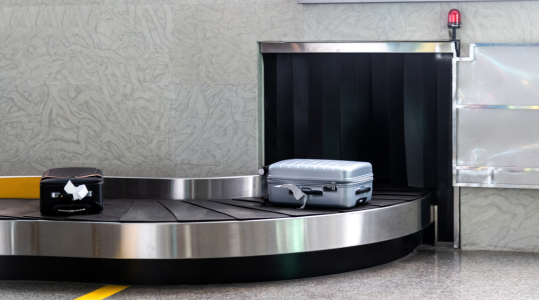Airline passenger wins $2,717 compensation after 18-month battle over lost luggage
By
- Replies 6
The tale of a Qantas passenger's gruelling 18-month quest for compensation after his luggage embarked on an unexpected global journey has shed light on the realities of air travel mishaps and the arduous battle for restitution that can ensue.
The personal frustration and inconvenience experienced by Michael Pascale also spotlight the broader issue of passenger rights in Australia's aviation industry, prompting calls for significant reform.
Michael Pascale's ordeal began innocuously enough with a flight from Brisbane to Sydney in May 2022.
His subsequent connection with Sri Lankan Airlines to Paris for a wedding should have been straightforward, but his bag failed to appear on the carousel.
'It was that situation of just watching it go round and round… and then it never shows up,' Pascale recounted.
Despite a barrage of calls and emails, Pascale's suitcase took a detour to Dubai and the UK before finally returning to Brisbane, all while he was visiting family in the US.
Resigned to the fact that his belongings wouldn't be joining him on his holiday, he made the necessary purchases to replace his items and resolved to seek a refund.
Qantas, however, ignored the issue, stating that since Sri Lankan Airlines last had possession of the bag, it was not their problem.
Sri Lankan Airlines initially offered a paltry $150, but Pascale was determined to fight for full compensation.
'I wanted my money… but I also didn’t want them to walk all over me,' he said.
The process was gruelling, involving extensive research and countless emails.
'I refused to let them win. To say it was an obsession is probably not too far from the truth,' Pascale admitted.
Ultimately, Pascale's dogged pursuit paid off, and he was awarded $2,717 in compensation.
Consumer advocates are now pushing for the introduction of an independent airline ombudsman, which would align Australia with other countries with more robust passenger rights frameworks.
Rosie Thomas, a spokesperson for consumer advocacy group CHOICE, emphasised the need for a fair, accessible, and free process for resolving airline disputes, akin to ombudsman schemes in sectors like telecommunications and financial services.
‘This should be fair, accessible, free and follow all of the principles similar ombudsman schemes in other sectors like telecommunications and financial services use,’ she stated.
‘Each airline will have different rules and requirements that define what you're entitled to when things don't go to plan,’
The Australian Lawyers Alliance (ALA) echoes this sentiment, with spokesperson Victoria Roy pointing out that Australia is 'very far behind' regarding passenger rights.
Currently, without a single framework, consumers are often forced into costly and complex litigation to reclaim their money, as was the case with Pascale.
The ALA advocates for creating a specific regulator or ombudsman to enable consumers to enforce their rights without legal intervention.
They claimed that ‘an independent regulator or ombudsman should be created to make binding decisions on air passenger consumer complaints, including compensation claims, where a resolution is impossible between the consumer and airline'.
The airline-funded Aviation Consumer Advocate (ACA) is the go-to for unresolved complaints.
Still, it needs more power to make binding decisions, often leading to complaint fatigue and consumer abandonment of claims.
The Australian Competition and Consumer Commission (ACCC) also does not handle individual complaints about delayed or cancelled travel services.
The upcoming Aviation White Paper, which will outline Australian aviation policies until 2050, is expected to address these issues.
Transport Minister Catherine King has indicated that the government seeks to create a more competitive aviation sector with robust consumer protections, improved complaint-handling processes, and better accessibility for consumers with disabilities.
She announced, ‘The Government is seeking outcomes that deliver a more competitive aviation sector while at the same time securing Australian jobs.’
‘We are also looking at stronger consumer protections, improvements to complaint handling processes, and improved accessibility for consumers living with disabilities,’
 Have you experienced a travel nightmare similar to Michael Pascale's? How did you navigate the process, and what changes would you like to see in the aviation industry to protect passengers? Share your experiences and thoughts with us in the comments below.
Have you experienced a travel nightmare similar to Michael Pascale's? How did you navigate the process, and what changes would you like to see in the aviation industry to protect passengers? Share your experiences and thoughts with us in the comments below.
The personal frustration and inconvenience experienced by Michael Pascale also spotlight the broader issue of passenger rights in Australia's aviation industry, prompting calls for significant reform.
Michael Pascale's ordeal began innocuously enough with a flight from Brisbane to Sydney in May 2022.
His subsequent connection with Sri Lankan Airlines to Paris for a wedding should have been straightforward, but his bag failed to appear on the carousel.
'It was that situation of just watching it go round and round… and then it never shows up,' Pascale recounted.
Despite a barrage of calls and emails, Pascale's suitcase took a detour to Dubai and the UK before finally returning to Brisbane, all while he was visiting family in the US.
Resigned to the fact that his belongings wouldn't be joining him on his holiday, he made the necessary purchases to replace his items and resolved to seek a refund.
Qantas, however, ignored the issue, stating that since Sri Lankan Airlines last had possession of the bag, it was not their problem.
Sri Lankan Airlines initially offered a paltry $150, but Pascale was determined to fight for full compensation.
'I wanted my money… but I also didn’t want them to walk all over me,' he said.
The process was gruelling, involving extensive research and countless emails.
'I refused to let them win. To say it was an obsession is probably not too far from the truth,' Pascale admitted.
Ultimately, Pascale's dogged pursuit paid off, and he was awarded $2,717 in compensation.
Consumer advocates are now pushing for the introduction of an independent airline ombudsman, which would align Australia with other countries with more robust passenger rights frameworks.
Rosie Thomas, a spokesperson for consumer advocacy group CHOICE, emphasised the need for a fair, accessible, and free process for resolving airline disputes, akin to ombudsman schemes in sectors like telecommunications and financial services.
‘This should be fair, accessible, free and follow all of the principles similar ombudsman schemes in other sectors like telecommunications and financial services use,’ she stated.
‘Each airline will have different rules and requirements that define what you're entitled to when things don't go to plan,’
The Australian Lawyers Alliance (ALA) echoes this sentiment, with spokesperson Victoria Roy pointing out that Australia is 'very far behind' regarding passenger rights.
Currently, without a single framework, consumers are often forced into costly and complex litigation to reclaim their money, as was the case with Pascale.
The ALA advocates for creating a specific regulator or ombudsman to enable consumers to enforce their rights without legal intervention.
They claimed that ‘an independent regulator or ombudsman should be created to make binding decisions on air passenger consumer complaints, including compensation claims, where a resolution is impossible between the consumer and airline'.
The airline-funded Aviation Consumer Advocate (ACA) is the go-to for unresolved complaints.
Still, it needs more power to make binding decisions, often leading to complaint fatigue and consumer abandonment of claims.
The Australian Competition and Consumer Commission (ACCC) also does not handle individual complaints about delayed or cancelled travel services.
The upcoming Aviation White Paper, which will outline Australian aviation policies until 2050, is expected to address these issues.
Transport Minister Catherine King has indicated that the government seeks to create a more competitive aviation sector with robust consumer protections, improved complaint-handling processes, and better accessibility for consumers with disabilities.
She announced, ‘The Government is seeking outcomes that deliver a more competitive aviation sector while at the same time securing Australian jobs.’
‘We are also looking at stronger consumer protections, improvements to complaint handling processes, and improved accessibility for consumers living with disabilities,’
Key Takeaways
- A Qantas passenger fought for 18 months to receive compensation for his lost luggage, which travelled around the globe without him.
- His persistent efforts to seek reimbursement for $2,717 from Sri Lankan Airlines were ultimately successful, bringing attention to the need for better consumer protections for travellers.
- Consumer advocates are calling for introducing an independent airline ombudsman in Australia to provide a fair, accessible, and free dispute resolution process.
- Australia is considered 'very far behind' in passenger rights, lacking a unified framework, and the upcoming Aviation White Paper may address stronger consumer protections and complaint handling improvements.








